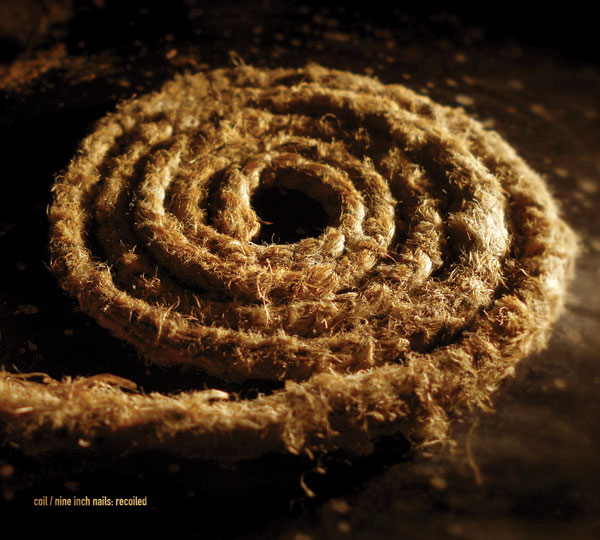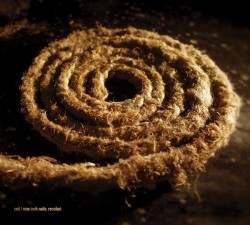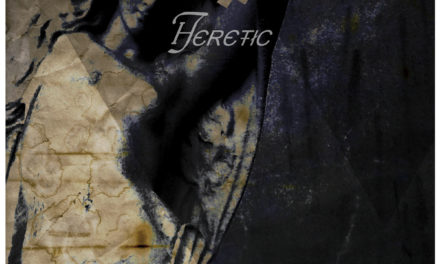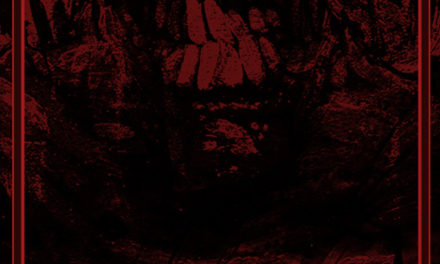Coil/Nine Inch Nails
Recoiled
Cold Spring
Despite an enormous profile within the world of industrial, one that stretches out well beyond into the realms of experimental and esoteric musics, the material Coil remixed for Nine Inch Nails is by far the most well-known work in the group’s catalog. Even leaving aside the opening credits of Se7en, the various contributions by Jhon Balance and Peter Christopherson to Trent’s oeuvre easily eclipse all of their own original material (appearing as they do on various highly charting albums and CD singles) in the public consciousness. Hell, if you Google “How to Destroy Angels” you’ll be four pages deep into the search results before you find a reference to the Coil album, instead of Reznor’s side-project named in tribute to the duo.
With that in mind, the idea that there is more material from any of those now storied remix sessions that had yet to be physically released is kind of incredible. Even more incredible is the idea that in spite of Nine Inch Nails’ global profile, which is probably greater now than it ever has been, that a small label like Cold Spring would be able to press said music and sell it. Without wanting to speculate on what sort of legal hoops the folks at CS might have had to jump through to make Recoiled a reality, it’s not hard to imagine the tangle of rights that might have prevented this from ever being anything other than a grey-area bootleg (4 out of 5 tracks previously appeared on a download only release Uncoiled compiled by the diligent fans of the NIN forum). One can only assume that the release has the blessing of erstwhile Coil collaborator Danny Hyde, whose involvement in these recordings can’t be overlooked, as he was reportedly Christopherson’s primary musical foil during the era. Suffice it to say, there were a lot of good reasons to think this release might never have happened.
And yet here it is, in glorious vinyl and compact disk, Recoiled. To be clear, most of the material on the release, which clocks in at 5 tracks and 40 minutes, falls into the realm of the ‘alternate’ take, with many of the remixes featuring the same effects, sequences and arrangements that would show up on the NIN remix releases. This is especially apparent on opener “Gave Up (Open My Eyes)”, which is quite similar to the version that kicks off Fixed. Far from making it inessential, it’s the differences which make it interesting. There’s just something so Coil about creaking backmasked sound of the intro, the subtle differences in how Trent’s oh-so familiar “Give it to me/I throw it away” mantra is affected, the specific way the cut-up guitar and drums are arranged. Those subtleties aren’t necessarily going to be apparent to folks who haven’t spent a lot of time with the more well-known versions, but there’s a certain revelatory quality to hearing Christopherson and Hyde’s sprawling, raw and unrefined interpretations.
Up next is an earlier version of the reinterpretation of “Closer” which famously kicked Se7en off, a precursor to “Precursor”, if you will. With some extra charnel synths intoning in the background, it feels less like the muck scraped from the inside of a murderous soul (sorry, but it’s just impossible to separate that mix from its cinematic outing) and more like the sacred processional experimentation Coil would undertake on Musick To Play In The Dark. The bubbling and somewhat melodic textures woven into “The Downward Spiral (A Gilded Sickness)” are perhaps not radically removed from their official iteration on Further Down The Spiral, but some quick comparisons remind the listener of just how much Hyde and Christopherson added (perhaps heavily cribbing from the Love’s Secret Domain playbook) to the original, maybe Reznor’s most structurally experimental composition until that point.
The reader might note that we keep returning to the idea that the similarities between Recoiled‘s tracks and the more familiar versions of these remixes only throw their subtle differences into sharper relief. To take this discussion in a somewhat personal direction, this isn’t just a function of having heard the latter so many times, but also the context in which those remixes were first heard: namely as part of our discovery of the Nine Inch Nails catalogue, much of it as it was being released while we were in high school. Not to completely torpedo our credibility, but we were listening to NIN well before proper Coil releases trickled down to us through fourth hand tape dubs and 56.6 Kbps Napster sessions. The result of this was that we couldn’t help but integrate Coil’s work on those mixes into our topography of NIN’s work, rather than as Coil qua Coil. Twenty years on from hearing those mixes, our interim immersion in and love for Coil is forcing us to realise just how much of the sonic weirdness on display here is classic Coil, and now has more in common with our exploration of that catalogue than remembrances of initial teenage NIN obsessions. The subtle and uncanny rearrangement of minor details on Recoiled‘s versions is only driving home just how deeply Coil’s very particular magic was inoculated within us without notice at that impressionable age.
The mystery of Recoiled‘s actual physical existence, here, now, can perhaps be credited to its easy slippage between taxonomies. It is the work of two bands (one defunct, one impossibly successful) and neither. It is the same as the official releases which it spawned (but which it came after) but not. It is a relic of the apex of commercial interest in industrial culture in the early 90s but is also an utterly cult artifact (the coloured vinyl has just sold out as we’ve gone to press with the standard black sure to follow). Like Nine Inch Nails and Coil’s erratic working relationship, it feels incomplete yet utterly tantalizing. Though not large, Recoiled contradicts itself and contain multitudes. It is real, it is here, and it will work an irresistible pull on a very certain sort of listener. We’re sure you already know where you stand in relation to it.







I had the same experience listening to this — that I was stunned just how Coil it all sounded, and how much of NIN’s weirdness during that era was encouraged and curated by Reznor in a way that seems completely impossible when you listen to Hesitation Marks.
The Cold Spring website says the CD and vinyl won’t even be shipped out until February 24. Did you get them early, or just review it from the “Uncoiled” digital compilation? Anyway, looking forward to this, and seeing more reviews of Cold Spring releases on ID:YD!
We got a sneaky digital sneak peak from the label. 🙂
More Aural Rage, please. The world has enough nin already, thank you.